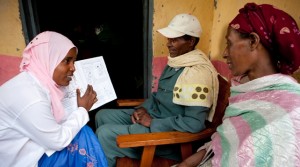Is Word Getting Out that Population and Climate Change are Connected?
Jan 27th, 2015 | By admin | Category: Climate Change, FeaturedBy Suzanne York.
“In fact, person for person, reducing birth rates in industrialized nations has a bigger impact on greenhouse gas emissions because affluent people use more of the Earth’s resources and depend more heavily on fossil fuels.” Thus wrote the editorial board of the Los Angeles Timesover the weekend.Word is getting out that population, climate, consumption and reproductive health issues cannot be ignored. There has recently been an increase in articles and reports on population and climate change, something that has been fairly taboo to discuss for many years.
As climate effects become more severe, inequality and poverty persists and increases, and too many women and families lack access or knowledge about reproductive health, the growing number and impact of people on the planet must not be avoided.
Even the Intergovernmental Panel on Climate Change (IPCC) acknowledged the implications of population and climate, stating that “Globally, economic and population growth continued to be the most important drivers of increases in CO2 emissions from fossil fuels.” The LA Times editorial board wrote that for the first time, the IPCC noted family planning programs as a way to make a difference in reducing the impact of climate change.
Experts Weigh In
We can’t change what we don’t talk about, and for the past year and a half, a group of experts on population dynamics/reproductive health and climate change have convened to deliberate on how best to link the issues.
Robert Engelman and Alexander Ochs of the Worldwatch Institute, who just released an opinion piece on climate and population; Worldwatch are part of this expert working group (along with the Population Reference Bureau). They stress the importance of universal voluntary family planning. Engelman and Ochs wrote that “Family planning has already slowed population growth significantly in the last four decades – and, as a consequence, it undoubtedly has also slowed the growth in greenhouse gas emissions.”
The experts came up with the following “action items” to spur dialogue on family planning as one solution to reducing the impact of climate change:
- Build awareness about trends in unintended pregnancy and unmet need for family planning, and their connections to climate change.
- Create an enabling environment for connecting these issues and advancing these policy opportunities by fostering more cross-sector dialogue and action among health, family planning, climate, and development sectors.
- Identify and act on policy opportunities to ensure that universal access to family planning is part of climate compatible development strategies.
- Increase the financing available for both climate change and family planning and create innovative financing for family planning within climate compatible development plans.
Getting Population Issues on the Global Agenda
As policymakers move toward the United Nations climate negotiations in Paris in late 2015, it is important that they have a greater understanding of population growth issues. Family planning and girls’ education are two of the easier and relatively low cost actions that can be implemented that reap enormous benefits. To do so requires political will, which is all too often has been missing in talks.
Elsewhere, the Center for Economic and Policy Research released an analysis late 2014 called The Consequences of Increased Population Growth for Climate Change. The conclusion? “An additional 1 percentage point of population growth through the end of the century may coincide with an additional 2 degrees of Fahrenheit in average global temperatures.”
Most people aspire to a higher and improved lifestyle. That process cannot be halted. For the time being, more people and more consumers equal more emissions.
To quote again the LA Times editorial board, “It is not a sustainable scenario to keep producing larger young populations. Our finite planet cannot host infinite growth. It’s already showing the strain.”
The first step is acknowledging and addressing “sensitive” topics and build a solid and positive base to improve lives and protect the planet as the human population grows for the foreseeable future.
Suzanne York is a senior writer with the Institute for Population Studies.



I also believe that population and climate change are connected. However, do you really think that just giving people more knowledge about something that they probably wouldn’t think twice about is going to do enough. The over population is going up an insane amount and living on this earth is getting more and more scary. Hasn’t everybody been “taking action” little by little every year? The fact is, if people aren’t passionate about it, the information will go in one ear and out the other. We have to get people interested!!